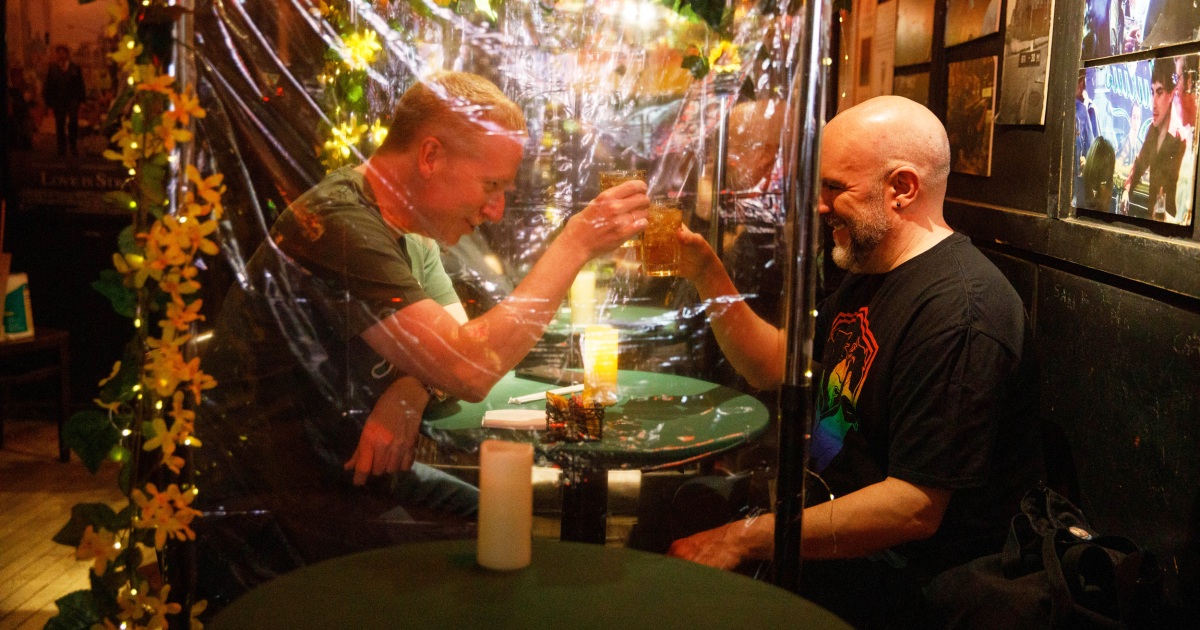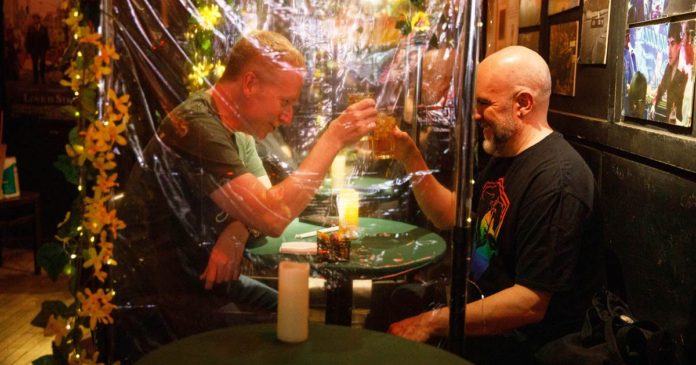
Much of Julius’ remains unchanged from that era, including the long wooden bar with a century’s worth of “scratchitti” carved into it. Jacob Ruppert Brewery beer barrels serve as tables and stools.
Chandeliers dangling overhead are made from wagon wheels of horse-drawn carriages that once delivered ice.
Julius’ had started attracting a gay following at least by the 1950s and, according to local lore, was a popular hangout for midcentury queer luminaries like Tennessee Williams, Truman Capote and Rudolf Nureyev.
But New York State Liquor Authority regulations at that time prohibited serving drinks to “known or suspected homosexuals,” whose very presence was considered disorderly behavior.
“This law was used to prevent the existence of gay bars, so the ones that did exist were under the control of the criminal underworld,” Randy Wicker, a member of the New York chapter of the Mattachine Society, one of the first gay rights groups, said. Either the mob ran the establishment or bar owners would pay for protection to avoid being raided.
“It forced gay people into that underworld,” Wicker, 83, said. “It led to exploitation, blackmail, people being brutalized.”
Wicker said The Mattachine Society wanted to challenge the liquor laws. “We felt it was very similar to how Black people were being denied the right to sit at a lunch counter,” he said.
The idea for a protest, or a “sip-in” as it was eventually called, was inspired by the sit-ins of the civil rights movement: On April 21, 1966, four members of the New York Mattachine chapter walked into a bar, declared they were homosexuals and demanded to be served. Assuming they would be refused, the group planned to file a complaint with the New York City Commission on Human Rights.
Julius’ was actually the fourth place the group hit that day, with Wicker joining Mattachine president Dick Leitsch, vice president Craig Rodwell and member John Timmons. The first bar they visited, the Ukrainian-American Village Restaurant, had been tipped off and closed early.
At Howard Johnson’s, the group declared, “We’re homosexuals and we want to be served.”
“The waitress laughed and said, ‘No problem,’ and took the order,” Wicker said.
It was getting late and they were in danger of losing the reporters who had tagged along. Julius’, it turned out, was the perfect spot for their test case: It had a sizable homosexual following, Wicker said, but the management was determined not to let it become a “gay bar.”
“There had been an entrapment case recently — someone went home with an undercover policeman,” he said. “So they patrolled the bar very strictly. If there were too many men together inside, they’d stop letting men in unless you came with a woman.”
The group walked in and ordered, then Leitsch announced, “We are homosexuals. We are orderly, we intend to remain orderly, and we are asking for service.”
A photographer for the Village Voice captured the moment the bartender put his hand over a glass and stopped making their drinks.
“I think it’s against the law,” he said, according to Wicker.
It was exactly the reaction Mattachine members had hoped for: Publicity from the “sip-in” led to the New York State Supreme Court ruling a year later that simply being gay — or even cruising or kissing — was not indecent behavior.
It didn’t just change liquor regulations, Wicker said. “It helped moved the gay community out of the grasp of the criminal world.”
Within a few years, there were legitimate, independent gay bars. They remained the nexus of gay life for decades, said LGBTQ historian Ken Lustbader, cofounder of the New York City LGBT Historic Sites Project.
“Because of LGBTQ discrimination by authorities, in policy and practice, there were really no other meeting places, no community centers,” he said. “Julius’ has been that space for so many people for so many years.”
And while New York’s gay bar scene has become a shadow of its former size — a victim of assimilation, gentrification and dating apps — Julius’ remained packed most weekends.
“I think there’s a pilgrimage aspect of it, especially for younger people,” Brian Sloan, a filmmaker who lived in the West Village for 20 years, said. “It has historical significance but it’s also a throwback to what gay bars used to be — lively, friendly, unpretentious. That’s harder to find now.”
Julius’ is still popular with celebrities — Lady Gaga, Sarah Jessica Parker, Zachary Quinto and Neil Patrick Harris have all stopped in, according to staff and regulars — and it has appeared in numerous films, including the Oscar-nominated Melissa McCarthy movie “Can You Ever Forgive Me?” and “The Boys in the Band,” both William Friedkin’s 1970 movie and the 2020 Netflix adaptation by Ryan Murphy.
Director John Cameron Mitchell, who first ventured into Julius’ in 1985, calls it his “local bar.”
“It’s dripping with queer history,” he said. “The photos on the wall, the Mattachine sip-in. It really led to the legalization of gay bars in New York.”
In 2008, Mitchell launched a monthly dance party at Julius’ called, appropriately enough, Mattachine.
“[We] wanted to preserve the feeling of our favorite alt-queer bars where you could hear rock, new wave, soul, funk and even slow jams,” he said. “Every month we honored a queer icon, and if they were still alive they would show up.”
Honorees have included the neurologist Oliver Sacks, the punk rock impresario Danny Fields, the Village People’s Randy Jones and Leitsch himself. “We even cursed queer villains like Roy Cohn in absentia,” Mitchell said of Sen. Joseph McCarthy’s chief counsel. Cohn targeted government officials as communists and homosexuals, despite being gay himself.
There’s no denying Julius’ place in history but, by drawing hundreds of revelers late into the night, the Mattachine parties have helped keep the bar from turning into a museum piece.
In 2016, the 50th anniversary of the sip-in, Julius’ was placed on the National Register of Historic Places for its role in “an important early event in the modern gay rights movement.”
Lustbader, who helped get the designation, said it’s mostly honorific and doesn’t protect the business itself, which has been hobbled by coronavirus lockdowns.
While Julius’ is part of the Greenwich Village Historic District, “preservation cares about the building itself,” he said. “We can’t protect what it’s used for.” “Here we have the authentic use of a historical space that’s still intact,” he added. “That’s really quite extraordinary.”
Helen Buford and her husband, Eugene, bought Julius’ in 2000.
“When we got the place, it was just a business decision,” Buford said. “But once my husband died and I started to be at the bar more often, a customer sat me down and said, ‘I don’t know what your plans are for this bar but, you know, it’s very important to the community. And this is why.’ And he proceeded to tell me about the sip-in. And I was floored.”
She’s worked to keep both the look and the spirit of the bar intact. Every Thanksgiving Buford offers a free hot buffet for anyone who might need a place to spend the holidays.








